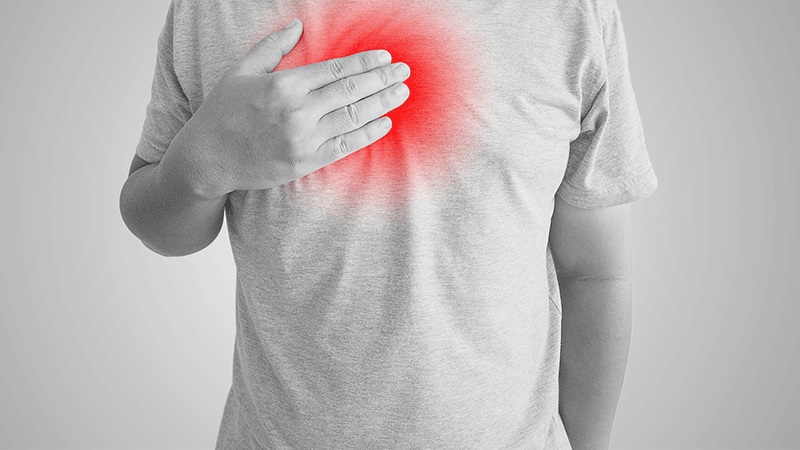Pain in your chest area can be alarming, but it doesn’t always mean you’re having a heart attack. Still, you shouldn’t ignore a pain in this area because other possibilities, like gastroesophageal reflux disease (GERD), should be taken care of too.

Heartburn vs. Heart Attack
Understanding the signs and symptoms of heartburn versus the signs and symptoms of a heart condition is critically important. The first condition only requires some medical attention and possibly medications like Prilosec® (omeprazole), while the latter requires a trip to the emergency room.
Characteristics of Heartburn
Heartburn is so-called because the area of pain is near the area of your heart. However, heartburn has to do with your digestive system, not your heart. The burning sensation of heartburn is caused by digestive acid moving up your esophagus, the tube food travels through to the stomach when you swallow.
Here are other features of heartburn:
- It typically happens after you eat or while you are lying down or bending over.
- The pain can wake you up from sleep, especially if you ate within two hours before bed.
- The burning sensation travels upward.
- You may taste sourness in your mouth. You may also feel the contents of your stomach at the back of your throat.
Characteristics of a Heart Attack
Heart attacks can be tricky because different people can have very different symptoms. The dramatic heart attacks you see on film and television aren’t always accurate.
A “typical” heart attack has the following features:
- A sensation of pressure, tightness, pain, or aching in the chest. This sensation may spread to the jaw, neck, and back.
- Nausea, heartburn, indigestion, and other abdominal pain
- Shortness of breath and lightheadedness
- Cold sweat
- Fatigue
Sometimes, even experienced medical professionals have trouble telling heartburn and heart conditions apart. The bottom line: if you have persistent pain in your chest and you’re not sure what it is, find medical help. It’s better to be safe than sorry.
How Heartburn Is Treated
Heartburn may seem very minor compared to heart attacks, but it should be given medical attention and treated nonetheless.
If you have gastroesophageal reflux (GER), it means your stomach contents are traveling back up your esophagus. Chronic GER is GERD or gastroesophageal reflux disease. GERD isn’t uncommon; in fact, about 20% of Americans live with it.
GER and GERD can be treated by changing certain habits, such as avoiding greasy or spicy foods and not eating too close to bedtime. You may also be advised by your health-care provider to take over-the-counter or prescription medication. You can access significantly cheaper medications from licensed pharmacies outside the United States through Canada Pharmacy Depot, a Canadian prescription service.
Importance of Treating Heartburn
Heartburn once in a while is usually not serious, but frequent heartburn can lead to complications such as:
- Problems of the esophagus, including inflammation, narrowing, and even precancerous changes
- Respiratory issues, such as congestion, hoarseness, laryngitis, and asthma
- A condition called Barrett’s esophagus, which may put you at increased risk of a serious form of esophageal cancer
Other Causes of Heartburn
Pain and/or discomfort in the chest can be caused by many things. This includes anything from a muscle spasm in the esophagus, a gallbladder attack, or gallbladder disease. If you notice the following more extreme symptoms, be sure to get medical help right away:
- Vomiting blood
- Dizziness
- Chest pain during exercise
- Trouble or pain while swallowing
- Bloody or black stools
- Shortness of breath
- Pain that travels to neck and shoulder
- Sweating during chest pain
Seek help if your heartburn happens more than three times a week for more than two weeks.
In general, if you experience chest pain or discomfort, get a professional opinion. It’ll give you peace of mind and a possible antidote, allowing you to enjoy your meals in comfort.

